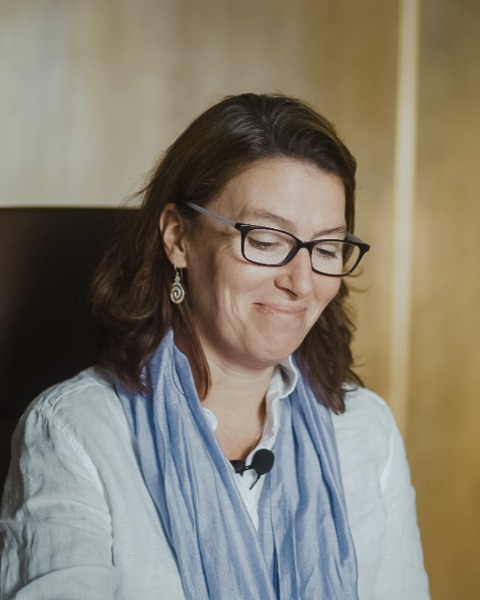Collaborative, Participatory & Empowerment Evaluation
Building inclusive rigor through stories
-

Helene Bradburn
Inclusive Rigor Network Coordinator
Independent, Spain -

Marina Apgar (she/her/hers)
Research Fellow
Institute of Development Studies - Centre for Development Impact, England, United Kingdom -
SD
Steff Deprez, n/a
Managing Partner
Voices That Count
Leuven, Vlaams-Brabant, Belgium -
EC
Edwin Cubillos, n/a
Coordinator
EPI - Photovoice, Colombia
Chair(s)
Presenter(s)
Location: Grand Ballroom 1
Abstract Information: This session is designed to bring to life the power of narrative methods for building ‘inclusive rigor’ in evaluation. Through illustrating how participatory narrative methods can be used within learning oriented evaluation designs, we will reflect on how stories can ground our understanding of what has been achieved, for whom and how, through the lived experience of system actors paying attention to the often excluded populations. The session will share diverse experiences including: (i) use of participatory lifestory and systems mapping methodology in the context of peacebuilding evaluation in Mali; (ii) combining photovoice with everyday peace indicators in Colombia; (iii) participatory narrative enquiry and SenseMaking to facilitate citizen engagement for participatory neighborhood development in Belgium. Panelists are all part of the inclusive rigor network and have co-produced a framework for inclusive rigor in complexity-aware evaluation, which will enable rich learning across the diversity of methods and contexts.
Relevance Statement: Addressing pressing development challenges such as urban development or reducing conflict and building peace, requires being aware of and navigating systems dynamics, where power plays a central role and multiple stakeholders bring their multiple perspectives. In such conditions of complexity and where evidence on what works is weak or non-existent, linear evaluation, which tracks an intervention to measure how its intended outcomes are reached, are unable to capture and work with emergent processes of change. Further, evaluation that aims to describe from the outside will struggle to understand what is happening within the system, missing key dynamics that can drive systems change and build evidence to inform programming. Instead, complexity-aware evaluation frameworks that put system actors at the center are more suitable. More embedded and learning-focused MEL systems that use participatory methods are needed. This calls for a redefinition of rigor, moving away from linear and rigid definitions that are based on exclusive knowledge hierarchies and dogmatic views of gold standards. Participatory and visual methods in evaluation often include a storytelling component, creating space for peoples’ diverse experiences and values to shape what we focus evaluation on and make sense together of how change happens. In practice, evaluators using participatory methods are often still confined by rigid definitions of rigor, leading to superficial use as participatory data collection but not sensemaking tools. And at worse, to tokenistic participation that produces anecdotes rather than evidence. So while we are celebrating the uptake of participatory narrative methods, situated in the evaluation field shifting towards equity and systems change, as the conference theme illustrates, this session will help us to unpack not just how we use the methods but how to do so with quality. The inclusive rigor framework offers opportunity to reflect on the conditions under which participatory narrative methods can generate rich, useful and credible evidence of how change happens in complex systems.
Participatory life story analysis: A methodology for systems changeMarina Apgar
Co-Authors:
Helene Bradburn – Inclusive Rigor Network Coordinator, Independent
Individual Presentation Description
This session discusses the use of life stories in the evaluation of a systemic action research project in Mali, which aims at empowering communities to analyze and act upon conflict inducing dynamics in an organized, evidenced based way. It is being evaluated using Outcome Harvesting and Contribution Analysis, fed by real time data gathered through embedded monitoring at every step. Not only the Systemic Research component, but also the Outcome Harvesting and Contribution Analysis process heavily relied on a critical mass of life stories. As part of the evaluation process, the effects of action research group initiatives were relayed to the evaluation team via 300+ life stories examining how not only the group initiatives, but also the way in which they were carried out, influenced both group members’, and ultimately the wider community’s perceptions of themselves and of the conflicts around them, and of their capacity to act. These life stories were used within the Contribution Analysis process to identify key causal pathways, patterns and differences when aggregated across localities and actors. The results show to what extent the stories people tell about themselves and their own community change through their participation to, and interactions with the action research process.
Participatory narrative inquiry and sensemaking: Using SenseMaker to facilitate citizen engagement for participatory neighborhood developmentSteff Deprez
Individual Presentation Description
This session presents the use of SenseMaker, a participatory narrative inquiry and sensemaking method to support a citizen engagement process within a vulnerable neighborhood in the City of Sint-Niklaas (Belgium). The aim of this 3-year initiative is to engage citizens in a participatory neighborhood development process that connects and empowers citizens to have a collective understanding of the opportunities and challenges in their neighborhood and to stimulate joint actions (including participatory budgeting initiatives in collaboration with the city). Through the community-based story listening process, gathering more than 250 stories and the multiple sensemaking processes, the people involved gained a deeper and more nuanced understanding of the perspectives, needs and concerns of individuals and the neighborhood. It also supports the city to develop more effective and equitable policies and initiatives grounded in the realities of people.
Participatory photography and Everyday Peace Indicators: Social impact and tensions of this relationship in conflict areasEdwin Cubillos
Individual Presentation Description
This session explores the possibilities of combining narrative, visual, and participatory methodologies in 6 prioritized rural communities in the implementation of the peace agreements in Colombia. These territories constitute a challenge for peace research and evaluation, as the reconfiguration of armed violence coexists with a new social movement that promotes peace in the territories after the signed agreement. Participatory photography plays an important role in representing, supporting, and deepening the stories of the most relevant everyday peace indicators (EPI) in these communities. In and of itself, it also has local impacts related to catalyzing social action, healing, and psychosocial care, strengthening of identity and intergenerational dialogue. What does it mean to address participatory images in the midst of these peacebuilding scenarios, surrounded by new violence? What challenges do narrative visual approaches have in transitional justice? Can this combination of narrative methods build a new genre of peace photography?
Presentations:
-
5:00 PM - 6:00 PM ETParticipatory life story analysis: A methodology for systems change
Presenter: Marina Apgar (she/her/hers) – Institute of Development Studies - Centre for Development Impact
Presenter: Helene Bradburn – Independent
-
5:00 PM - 6:00 PM ETParticipatory narrative inquiry and sensemaking: Using SenseMaker to facilitate citizen engagement for participatory neighborhood development
Presenter: Steff Deprez, n/a – Voices That Count
-
5:00 PM - 6:00 PM ETParticipatory photography and Everyday Peace Indicators: Social impact and tensions of this relationship in conflict areas
Presenter: Edwin Cubillos, n/a – EPI - Photovoice
-
5:00 PM - 6:00 PM ETWelcome and introduction to the Inclusive Rigour framework and case studies
Presenter: Helene Bradburn – Independent
